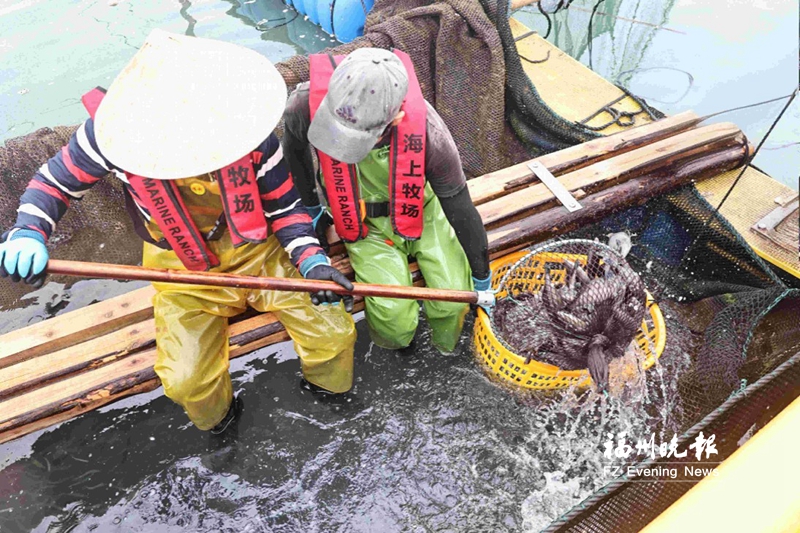800,000 Navodon Septentrionalis from Lianjiang Hit the Market, Marking China’s First Large-Scale Deep-Sea Aquaculture Production
The Navodon septentrionalis farmed in the waters off Tailu Town, Lianjiang, has recently begun appearing in the market. This marks China’s first large-scale production of the species through independent breeding and deep-sea aquaculture, highlighting a breakthrough in China’s aquaculture technology.

Workers were catching Navodon septentrionalis.
Recently, the reporter visited the farming base of Fujian Offshore Ranch Investment and Development Co., Ltd. by boat, where workers were busy pulling in nets to catch Navodon septentrionalis.
“The harvested Navodon septentrionalis is promptly bled to remove any fishy odor, then packed into insulated boxes with ice to maintain freshness. It is transported to a processing plant in Pukou Town, where it is skinned, gutted, and further processed into “Emerald File Fish.” The finished products are then distributed to regions like Sichuan and Chongqing, where they are often used in hot pots or braised dishes,” said Shen Heng, Business Manager of Fujian Offshore Ranch Investment and Development Co., Ltd. The harvested fish are also transported live to seafood markets in Lianjiang and the surrounding areas of Fuzhou for sale.
It is reported that the 800,000 Navodon septentrionalis harvested this time are from the “Dongluo No. 1” variety independently bred by Fujian Hengyi Development Group. This variety is known for its high survival rate and short farming cycle.
The Navodon septentrionalis, commonly known as “Leather Jacket,” is renowned for its tender, flavorful meat and absence of intermuscular bones, earning it the nickname “boneless fish.” It is especially suitable for the elderly and children.
As the largest Navodon septentrionalis farming base in China, the Phase I farming area of Fujian Offshore Ranch Investment and Development Co., Ltd. spans approximately 170 mu. In a single cycle, it can cultivate up to 11 million Navodon septentrionalis. Once Phase II reaches full capacity, the farming scale will increase to around 20 million per cycle, with an estimated annual output value of 270 million yuan. (Fuzhou Evening News Reporter: Zheng Ruiyang; Correspondent: Lian Rongmei, Text/Photo)